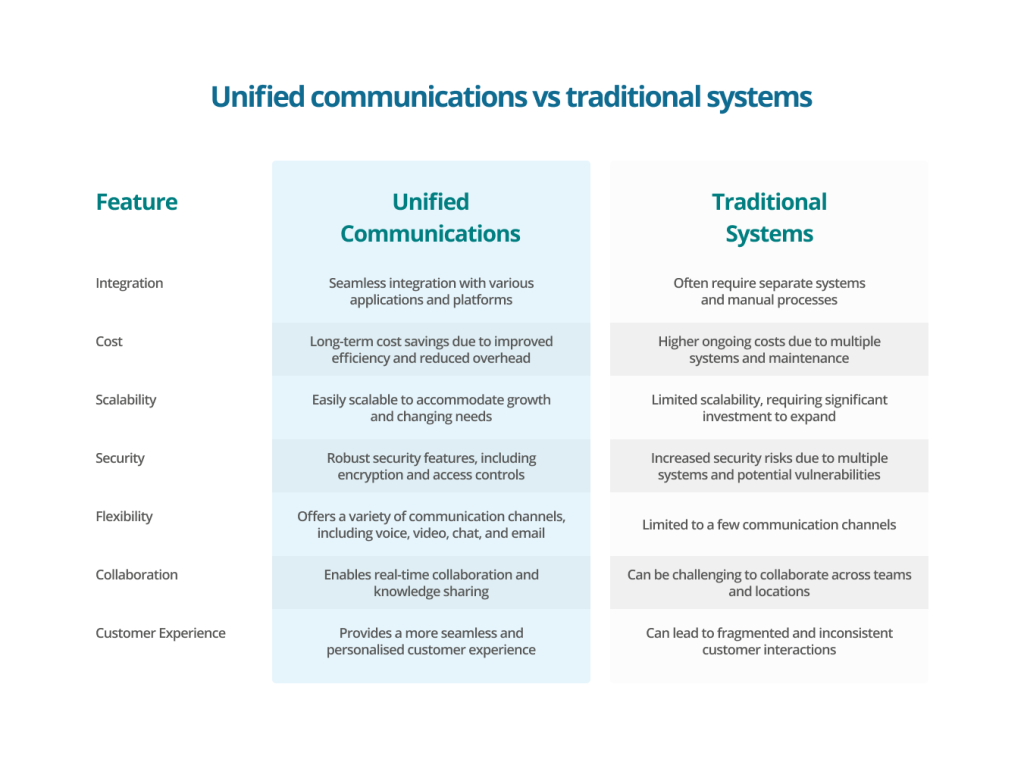Navigating Travel Industry Risks with Intelligent Communications
We’re going to explore some real-life unforeseen circumstances that the travel industry has had to navigate and how intelligent communications solut...
A recent study revealed an alarming statistic: poor communication costs manufacturing companies an average of $62 million (£47 million) per year. This highlights the urgent need for improved communication solutions in today’s competitive manufacturing landscape.
Effective communication is essential for business success as poor communication can lead to significant losses in productivity and revenue. Unified communications (UC) offers a solution by providing a centralised platform for seamless collaboration and communication across teams.
For manufacturers, this type of solution can be especially beneficial due to the complex and multi-site nature of their operations.
Are you tired of the costly consequences of poor communication in your manufacturing operations? Keep reading to discover how unified communications can help accomplish greater efficiency for manufacturing companies or speak to an Elite expert today.
In the fast-paced world of manufacturing, effective collaboration is key to success. Unified Communications provides a powerful platform for teams to connect and work together seamlessly, regardless of their location.
With unified communications, employees can easily initiate video calls, share screens, and collaborate on documents in real-time, eliminating the need for time-consuming meetings or email exchanges.
Unified communications streamlines communication processes, allowing employees to get more done in less time. By providing instant access to colleagues and information, UC reduces the time spent searching for the right person or waiting for responses.
This increased efficiency translates to higher productivity and faster project completion.

Delivering exceptional customer service is essential in the manufacturing industry. Unified communications empowers employees with the tools they need to quickly address customer inquiries and resolve issues.
Customer service representatives can easily access relevant information, collaborate with colleagues, and provide timely and accurate responses, enhancing customer satisfaction.
Unified communications can help manufacturing organizations streamline operations across geographically dispersed locations. By integrating communication systems into a single platform, businesses can reduce costs associated with managing multiple PBX systems.
Additionally, unified communications provides a centralised view of performance metrics, enabling organisations to identify trends, optimise processes, and make data-driven decisions.
Unified communications offer employees greater flexibility in how they communicate and stay connected. Whether they’re on the factory floor or working remotely, employees can easily access UC features from their smartphones or other devices.
This flexibility enhances productivity and enables employees to work more efficiently.
Unified Communications as a Service (UCaaS) provides valuable insights into your organization’s communication environment. Real-time support and reporting tools offer detailed information about usage patterns, call quality, and other key metrics. This data can be used to identify trends, troubleshoot issues, and optimise your communication infrastructure.
By implementing a unified communications solution, manufacturing companies can improve collaboration, increase productivity, enhance customer service, streamline operations, and gain valuable insights into their communication environment.
In the often hazardous environment of manufacturing, effective communication is crucial for ensuring employee safety. A Unified communications solution can play a vital role in mitigating risks and promoting a safer workplace.
Unified communications can provide a centralised platform for accessing safety guidelines, emergency procedures, and other essential documentation. Employees can quickly connect with experts for immediate support and guidance. Additionally, UC enables timely dissemination of safety alerts and notifications to relevant personnel.
A unified communications system could also help track safety data and ensure compliance with industry regulations. By leveraging data analytics and insights, manufacturers can identify potential hazards, implement preventive measures, and maintain a safe working environment.

In the digital age where technology is expanding rapidly, traditional phone lines are no longer suitable to sustain all communications for leisure businesses.
In fact, switching to a digital or cloud-based alternative is less of a welcome upgrade and more of a necessity at this point, if leisure businesses want to remain fully connected to their customers and each other internally.
The upcoming PSTN switch-off will see traditional analogue phone lines in the UK deactivated, meaning both civilians and businesses need to move to digital communications if their phone systems still run on these lines.
Many businesses whose communications systems are reliant on legacy technology still need to make the switch before the lines go down. This is why British Telecom has delayed the PSTN switch-off from 2025 to 2027.
By moving to unified communications, leisure businesses can avoid losing communications – internally and externally – and can enjoy more reliable and sustainable connections.
Should a leisure business opt for unified communications to avoid the pitfalls of the PSTN switch-off, it’ll also benefit from other great advantages by replacing analogue lines with VOIP technology.
VOIP stands for ‘Voice Over Internet Protocol.’ In layman’s terms, it converts analogue signals received by phones into digital ones, so they can be easily transferred, saved or manipulated. This works well for saving important calls to the cloud, so they can be referred back to later.
HD calling is another great advantage of VOIP. Offering far clearer voices than analogue lines, leisure staff can converse more clearly with customers, and serve them more effectively.
Ready to transform your manufacturing operations with unified communications? Elite Group is your trusted partner for seamless implementation and ongoing support.
With years of experience serving businesses like yours, we offer tailored solutions to meet your specific needs. Our dedicated account managers will guide you through the entire process, from onboarding to ongoing support, ensuring you get the most out of your UC investment.
Key benefits of choosing Elite Group include:
Contact Elite Group today to schedule a consultation and learn how unified communications can revolutionise your manufacturing operations.